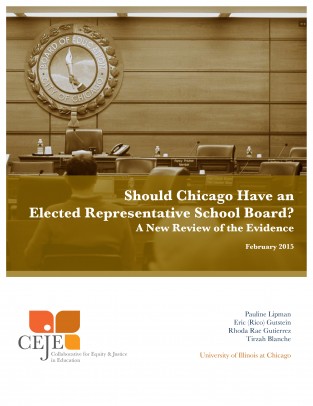Chicago needs elected school board, study says

The Collaborative for Equity and Justice in Education at UIC calls for an elected, representative and accountable board.
Chicago needs an elected, representative school board, according to a report by University of Illinois at Chicago researchers citing greater inequity after 20 years of mayoral control of Chicago Public Schools and its appointed school board.
All other Illinois districts — and 98 percent of school districts across the U.S. — have elected boards, the report states. In Chicago, appointments have been made by the mayor, the city council and nominating commissions.
“Local school boards are the political institutions that are closest to voters. They respond to the community’s vision of the common good,” says Pauline Lipman, professor of educational policy studies and lead author of the report with co-author Rico Gutstein, professor of curriculum and instruction.
“The appointed board’s policies have become increasingly contentious. Parents, community organizations, academics, civic leaders, politicians and the Chicago Teachers Union have called for an elected school board,” Lipman said. “The report was written to inform public discussion of this issue.”
The researchers analyzed CPS and Illinois State Board of Education data, national test scores, and broad indicators of achievement and opportunity to learn, as well as qualitative data.
“Our analysis emphasizes how board policies affect educational equity, because 91 percent of CPS students are people of color,” Lipman said.
They examined board policies related to high-stakes tests, selective enrollment, school closings, teacher turnover, charter schools, schools managed by the nonprofit Academy of Urban School Leadership, and the Chicago High School Redesign Initiative — a CPS initiative that opened 23 small high schools to address high dropout rates and low academic performance.
“There is no conclusive evidence that mayor-appointed boards are more effective at governing schools or raising student achievement,” the researchers wrote. “Under the mayor-appointed board, racial disparities in educational outcomes persisted, and in some cases widened.”
The researchers state that:
- Opportunities to learn have become less equitable as CPS established a two-tier school system: the board prioritized selective programs and schools while neighborhood schools serving low-income students lost resources. Tests were misused punitively to close schools or narrow their curricula.
- Neighborhood school closings have not improved education for most students but have disproportionately harmed African American students, communities and teachers.
- Privatization generally has not improved education. Most charter and contract schools are doing no better than neighborhood schools, and are more likely to expel students. Privately managed schools are also further removed from public accountability, yet the board turned over one-quarter of CPS schools to private operators.
- The board engaged in questionable financial arrangements and thus was a poor steward of public resources.
- Mayoral control and board processes limit public input and accountability. The board has been unresponsive to public opposition to its policies and indifferent to advice from parents, teachers, and education experts.
The researchers recommend an elected school board that will prioritize equitable educational opportunities and outcomes; make its operations transparent and be accountable to the public; strengthen public participation in CPS initiatives and decisions; and draw on sound educational research and the knowledge of teachers, students and communities to develop policy.
